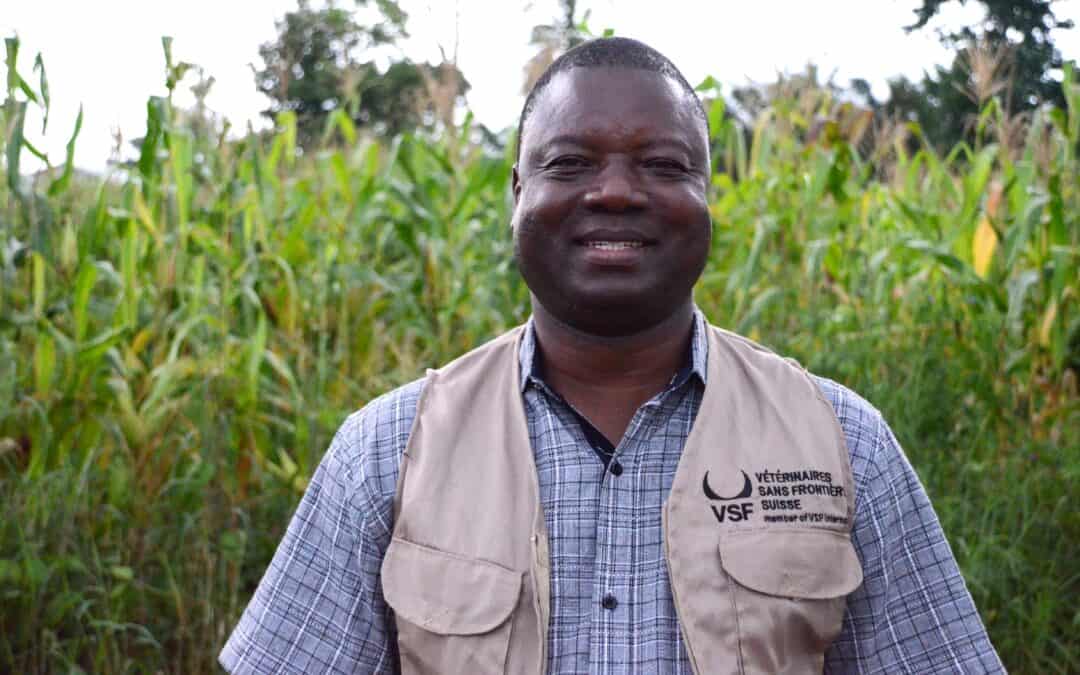In September 2022, Salomon Nikiéma started his position as Country Director of VSF-Suisse in Mali. In his role, he manages the projects in Mali and is also responsible for our cross-border activities in West Africa. In this interview, Salomon tells us a little about himself, the most important moments of his first months in office, and the challenges that the region will face in the coming years.
Hello Salomon, tell us a little about where you are from.
I was born in Burkina Faso, in the town of Kombissiri, 42 km south of the capital Ouagadougou. I did my primary and secondary education at the provincial high school of Kombissiri. Faced with the lack of the educational infrastructure at the time in my hometown, I was assigned by the state with a scholarship to the Protestant College of Ouagadougou, where I obtained my scientific baccalaureate in 1994.
And what was your dream profession at that time?
I dreamed of becoming a pilot. To achieve this goal, I enrolled at the University of Ouagadougou in the Faculty of Science and Technology. In my second year, in 1996, I was admitted to the Air Afrique training programme, but unfortunately, due to bad governance, the company was liquidated at that time. The new recruits, including me, had no chance to continue their training.
And how did you get into the field of international cooperation after that?
I was always passionate about getting involved in this sector. Already in 1994, I had founded an association in the fight against HIV/AIDS and STIs with fellow students and young people from the neighborhood where my college was located. Following a career in development was a natural choice for me and something I am passionate about. To kick things off I then started to study sociology.
So, your academic background is in sociology?
Yes, I have a degree in sociology from the University of Ouagadougou. However, in view of the challenges developing countries in general and my country, Burkina Faso, in particular are facing, I found it appropriate to undertake other complementary academic training. I thus completed two professional masters in Project Management and in Decentralization and Local Development and an MBA in Diplomacy-Cooperation and International Relations. In 2020, I also obtained a certificate of expertise in management of international institutions and projects.
What were your most important professional steps before joining VSF-Suisse?
After a decade as Country Director with the British NGO ACORD (Agency for Cooperation and Research in Development) which withdrew from Burkina in 2016, I joined another British NGO to implement a consortium project on the resilience of vulnerable communities in Northern and Sahel Burkina over the period 2017 to 2020. After a short term for an Italian NGO as General Consortium Coordinator on a Burkina-Niger resilience project, I finally joined VSF-Suisse in September 2022.
Was it easy for you to adapt to your new position?
The role of Country Director was not new to me, let alone the coordination of cross-border activities. I have also worked in livestock, dairy and local cattle breed improvement projects as well as on agroecology in the past. I must say that I benefited from a quite complete immersion program with the different teams of VSF-Suisse and our partners. Less than a month after I started, I had the opportunity to participate in the annual senior managers’ meeting and the celebrations of 20 years of VSF-Suisse in Togo. This further accelerated my integration within the VSF-Suisse family. I can thus honestly say that the adaptation was not difficult at all!
What were the tasks that kept you busy during the first months at VSF-Suisse?
The most important thing was to quickly familiarize myself with the activities and projects already underway. For the first few months, this meant reading a lot and meeting many contacts, on the one hand the partners, and on the other hand the people for whom and with whom we work.
What are the biggest challenges for Mali and other countries in the region?
The complex security issue remains the greatest challenge for Mali and the Sahel region in general. Added to this are the adverse effects of climate change with its corollary of droughts, floods and food insecurity. Good governance and social cohesion also remain permanent challenges.
How do you see VSF-Suisse’s future commitment in this respect?
VSF-Suisse will have to remain involved in its area of specialization and ensure that agro-pastoral communities get the best out of their livestock. We need to continue engaging with communities that are leading change and promote sustainable approaches.
What is the greatest strength of VSF-Suisse?
VSF-Suisse places great emphasis on local partnership, a beneficiary-centered approach and flexible and adaptive intervention approaches. I am sure that the position I hold has enormous potential to make a qualitative change in the lives of Malians and cross-border communities.
Thank you, Salomon, and all the best!



